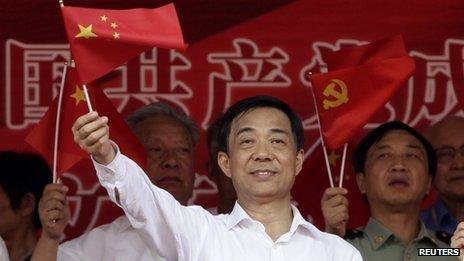China scandal: Is Bo Xilai victim of political dispute?
- Published

China has moved quickly to cast the downfall of one of the country's top politicians as a simple case of legal wrongdoing.
Bo Xilai has been stripped of his position in the Communist party's politburo because of his connection with the suspected murder of British businessman Neil Heywood.
A series of official editorials say the investigation into Mr Bo is an example of the Communist party "safeguarding the rule of law".
These commentary pieces have dismissed the idea that Mr Bo's fall from grace is anything to do with political disagreements at the top.
But some experts believe this is a far too simplistic interpretation of Mr Bo's sacking, which comes in the run-up to the party's once-in-a-decade leadership change later this year.
"This is a political rather than a legal case," said Prof Steve Tsang, director of the China Policy Institute at the UK's Nottingham University.
Law 'used as tool'
An editorial carried by the People's Daily immediately after it was announced that Mr Bo had lost his politburo seat began the party's version of events.
It said the case showed there was respect for the facts and the legal system. "There is no privileged citizen before the law," it added.
Another newspaper, The Global Times, said this case marked a new stage of openness in China.
"China has ended the era of 'hiding one's sickness for fear of treatment'," read an editorial in the party-controlled newspaper.
But the idea that Mr Bo's legal case could take place without political approval is to misinterpret the role of the judicial system in China.
It is, first a foremost, a tool used by the party to pursue its policies - a fact that is openly admitted by senior officials.
A report into China's legal system delivered at this year's annual parliamentary session in Beijing gave just one example of this viewpoint.
It said the most important task for legal workers was to "unite around the implementation of the party and the state's policies and carry out legislative work according to major policy arrangements".
Not much there about prosecuting a case according to the facts.
"Whoever is in power has to make sure that the judicial apparatus is under the control of the dominant faction," said Willy Lam, of the Chinese University of Hong Kong.
"It's then easy to use the law to attack your opponents."
This has been done before.
Former Beijing mayor Chen Xitong and Chen Liangyu, ex-party secretary in Shanghai, were both sent to prison for corruption.
But in both cases political in-fighting was thought to have been a contributing reason behind their downfall.
Leaders 'lack consensus'
Perhaps most important of all, China's message that Bo Xilai's case is a simple legal matter ignores one vital point - he has not yet been accused of committing any crime.
So far the authorities have said only that he was involved in "serious discipline violations" related to the suspected murder of Mr Heywood.
In these circumstances it is hard to see how the fall of Bo Xilai is just a legal case.
The party has also worked hard to dismiss the suggestion that the affair is connected to any disagreements at the top of the communist party.
"It is nothing to do with a so-called 'political struggle'," read an article by the state-run news agency, Xinhua.
This interpretation is rejected by analysts.
If the party was really unified, why bother continuing to stress the point?
Prof Xiang Songzuo, from the People's University in Beijing, said China's top leaders do not like to criticise each other in public in order to give the impression of unity.
But he added: "They have struggles and disputes, and very different perspectives. They don't have consensus."
The world has had a glimpse of those disputes as the party gears up for its 18th party congress later this year, an event at which it will choose the next generation of leaders.
Bo Xilai was a charismatic and popular politician who many expected would be promoted at this party gathering.
He appears to be a victim of the factional in-fighting in the lead-up to the congress.
What he did, how he is linked to the death of Neil Heywood and why he was sacked are still unanswered questions.
And with the party's monopoly on the truth, as Prof Tsang put it, the full story might take some time to emerge - if it ever does.
But Willy Lam is clear about what this case says about Chinese politics. He said: "This is very reminiscent of the old-style back-stabbing under Mao Zedong."